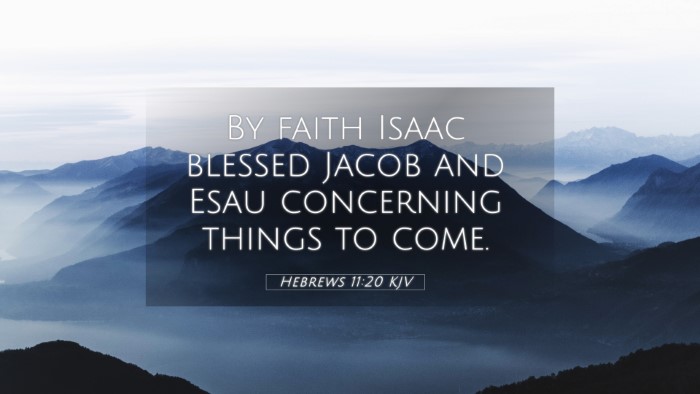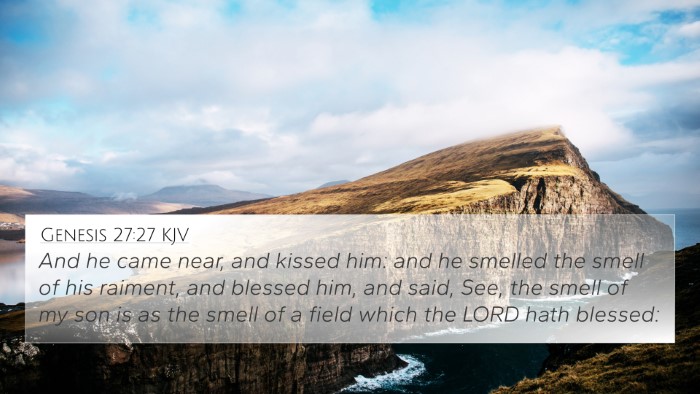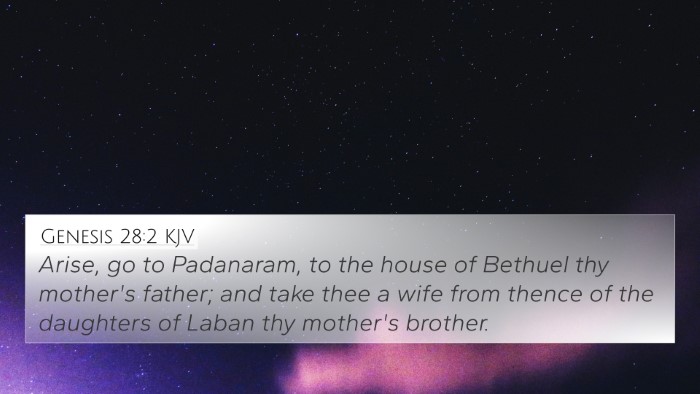Understanding Hebrews 11:20
Hebrews 11:20 states, "By faith Isaac blessed Jacob and Esau concerning things to come." This verse highlights the significance of faith in the patriarchal blessings given by Isaac to his sons, Jacob and Esau.
The act of blessing is deeply rooted in the biblical tradition, representing divine favor and the transmission of promises. In this case, Isaac blesses Jacob and Esau, underscoring the faith he exhibited, believing in the fulfillment of God’s covenantal promises for their futures.
Observations from Commentaries
-
Matthew Henry:
Henry emphasizes that Isaac’s blessings were given in faith, not on mere physical or earthly considerations. His reliance on God’s promises positioned the blessings as more than mere parental approvals—they became prophetic declarations about their destinies.
-
Albert Barnes:
Barnes articulates that Isaac's blessings were significant in their recognition of God’s sovereignty in choosing Jacob over Esau, affirming that God's election is crucial in the unfolding of His purposes. This act was delivered with the expectation that God's will would prevail in their lives.
-
Adam Clarke:
Clarke notes that Isaac, though initially inclined to bless Esau, ultimately honored God's divine choice. This illustrates the theme of faith overriding human judgment—a common thread throughout the biblical narrative. Clarke elucidates the importance of understanding the nature of faith as it pertains to divine blessings.
Connections to Other Bible Verses
Hebrews 11:20 can be richly understood through its connections with other scripture passages. Below are significant cross-references that illuminate the themes of faith, blessings, and divine purpose:
- Genesis 27:27-29: Isaac's blessing of Jacob, where Jacob receives the profound promise of dominance over his brothers and the nations.
- Romans 9:10-13: Paul elaborates on God’s choice of Jacob over Esau, affirming God's sovereign selection.
- Hebrews 11:1: The definition of faith as the assurance of things hoped for, correlating to Isaac's faith in God's promises.
- Galatians 3:29: Showing that believers are the descendants of Abraham, echoing the covenantal promises transmitted through Jacob.
- Matthew 1:2-3: The genealogy of Jesus Christ, highlighting the significant line of Jacob extending into the New Testament.
- 1 Chronicles 1:28-34: This passage reviews the descendents of Isaac and their importance in the narrative of Israel.
- Ephesians 1:3: Illustrating the spiritual blessings believers receive in Christ, paralleling the blessings Isaac conveyed to his sons.
Thematic Biblical Connections
The blessings given by Isaac exemplify the broader biblical theme of divine selection and the passing of covenantal promises. This act resonates deeply with:
-
Faith in Action:
Isaac’s faith in blessing his sons reflects a broader motif where individuals act in accordance with God’s will, despite their circumstances.
-
God’s Sovereignty:
This theme is recognizable throughout scripture, where God's choices often defy human expectations and biases.
-
Transitional Promises:
The blessings can be seen as pivotal moments of transition in God’s redemptive history, pointing toward Jesus Christ.
Conclusion
Hebrews 11:20 serves as a rich narrative of faith and divine promise encapsulated in the simple act of blessing. Through the insights from public domain commentaries, we expand our understanding of how Isaac's faith not only shaped the destinies of Jacob and Esau but also echoes throughout the scripture as a model of trusting in God’s unfolding plan. Thus, the connections between this verse and others provide a comprehensive panorama of God's dealings with humanity and His unwavering commitment to fulfill His promises.




